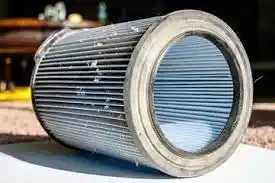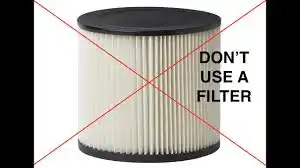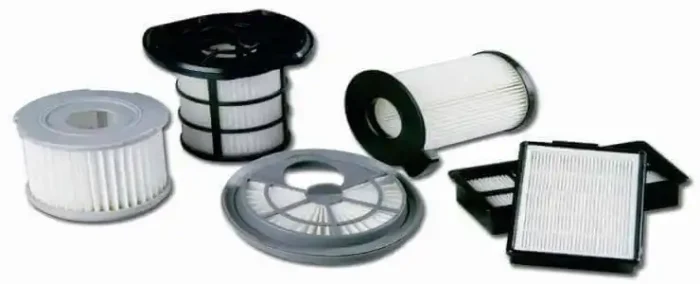
Can You Use a Vacuum Without a Filter? (Pros & Cons)
As someone who has been in the cleaning industry for several years, I have come across many people who wonder if they can use a vacuum cleaner without a filter.
The truth is, vacuum filters play a vital role in ensuring that the air in your home or office is free from dust and other particles. However, there are situations where using a vacuum cleaner without a filter may be necessary.
In this article, I will explore the pros and cons of using a vacuum cleaner without a filter and help you determine if it’s the right choice for you.
Introduction to Vacuum Filters

Before we dive into the pros and cons of using a vacuum cleaner without a filter, it’s essential to understand what vacuum filters are and what they do.
Vacuum filters are designed to trap dirt, dust, pet hair, and other particles that are sucked up by the vacuum cleaner. Without a filter, these particles would be released back into the air, leading to poor indoor air quality.
Vacuum filters come in different types and designs, including HEPA filters, foam filters, and dust bags.
Can You Use a Vacuum Without a Filter?
The answer is yes; you can use a vacuum cleaner without a filter. However, it’s important to note that using a vacuum cleaner without a filter may not be the best choice for everyone.
If you have allergies, asthma, or any other respiratory conditions, using a vacuum cleaner without a filter may not be ideal.
Additionally, if you have pets or live in a dusty environment, using a vacuum cleaner without a filter may not be effective in removing all the dirt and dust particles.
Pros of Using a Vacuum Without a Filter

One of the main advantages of using a vacuum cleaner without a filter is that it reduces the amount of maintenance needed.
Filters need to be cleaned or replaced regularly to ensure that the vacuum cleaner is working efficiently. Without a filter, you won’t have to worry about this extra maintenance task.
Another advantage of using a vacuum cleaner without a filter is that it increases the suction power of the vacuum cleaner. Filters can sometimes restrict airflow, reducing the suction power of the vacuum cleaner. Without a filter, you’ll be able to clean your carpets and floors more effectively.
Lastly, using a vacuum cleaner without a filter can save you money in the long run. Filters can be expensive, and replacing them regularly can add up over time. By using a vacuum cleaner without a filter, you won’t have to spend money on replacement filters.
Cons of Using a Vacuum Without a Filter

While there are some benefits to using a vacuum cleaner without a filter, there are also some downsides to consider. One of the main disadvantages is that the air quality in your home or office may be compromised.
Without a filter, dust and other particles will be released back into the air, potentially causing respiratory problems or aggravating existing conditions.
Another disadvantage of using a vacuum cleaner without a filter is that it will be less effective in removing dirt and dust particles.
Filters are designed to trap these particles, so without a filter, the vacuum cleaner may not be able to pick up all the dirt and dust. This can lead to a less clean environment and may exacerbate allergies or respiratory conditions.
Lastly, using a vacuum cleaner without a filter may void the warranty of your vacuum cleaner. Manufacturers often require the use of filters to ensure that the vacuum cleaner is working correctly.
If you use a vacuum cleaner without a filter and something goes wrong, the manufacturer may not honor the warranty.
Types of Vacuum Filters

There are many different types of vacuum filters available, each with its own advantages and disadvantages. Some of the most common types of vacuum filters include:
- HEPA filters: These filters are designed to trap small particles, including pollen, pet dander, and dust mites. They are a good choice for people with allergies or respiratory conditions.
- Foam filters: These filters are washable and reusable, making them a more eco-friendly option. They are not as effective as HEPA filters but can still trap larger particles.
- Dust bags: These filters are designed to trap dirt and dust inside a bag, making them a good choice for people who want to minimize dust exposure. They need to be replaced regularly.
How to Clean and Maintain Your Vacuum Filter
If you decide to use a vacuum cleaner with a filter, it’s essential to clean and maintain the filter regularly. This will ensure that your vacuum cleaner is working efficiently and that the air in your home or office is free from dust and other particles. Here are some tips for cleaning and maintaining your vacuum filter:
- Check the manufacturer’s instructions for cleaning and replacing the filter.
- Wash the filter regularly with soap and water or replace it if it’s disposable.
- Let the filter dry completely before putting it back in the vacuum cleaner.
- Clean the vacuum cleaner’s dustbin or dustbag regularly.
Vacuum Models That Don’t Require Filters

If you’re looking for a vacuum cleaner that doesn’t require a filter, there are some models available. These include:
- Cyclonic vacuums: These vacuums use centrifugal force to separate dirt and dust, eliminating the need for a filter.
- Water filtration vacuums: These vacuums use water to trap dirt and dust, making them an excellent choice for people with allergies or respiratory conditions.
- Bagless vacuums: These vacuums use a dustbin to collect dirt and dust, eliminating the need for a filter.
Alternatives to Vacuum Filters
If you’re looking for an alternative to vacuum filters, there are some options available. These include:
- Air purifiers: These devices are designed to clean the air in your home or office, removing dust, allergens, and other particles.
- Dust mite covers: These covers are designed to encase your mattress, pillows, and bedding, preventing dust mites from entering the air.
Common Misconceptions About Vacuum Filters
There are some common misconceptions about vacuum filters that are worth addressing. One of the most common is that all vacuum filters are the same. As we’ve discussed, there are many different types of vacuum filters, each with its own advantages and disadvantages.
Another misconception is that vacuum filters only need to be replaced when they’re visibly dirty. In reality, vacuum filters should be replaced or cleaned regularly, even if they don’t appear dirty. This will ensure that your vacuum cleaner is working efficiently and that the air in your home or office is free from dust and other particles.
Conclusion: Is Using a Vacuum Without a Filter Right for You?
In conclusion, using a vacuum cleaner without a filter can be a viable option for some people, but it’s not the best choice for everyone. If you have allergies, asthma, or any other respiratory conditions, using a vacuum cleaner without a filter may not be ideal.
Additionally, if you have pets or live in a dusty environment, using a vacuum cleaner without a filter may not be effective in removing all the dirt and dust particles.
If you’re considering using a vacuum cleaner without a filter, it’s essential to weigh the pros and cons carefully. Consider your specific needs and circumstances to determine if using a vacuum cleaner without a filter is the right choice for you.
